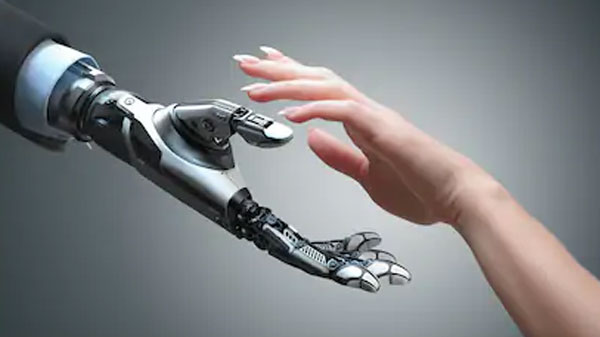Just In
- 5 hrs ago

- 5 hrs ago

- 6 hrs ago

- 6 hrs ago

Don't Miss
- News
 Why Was There No Indian Ambassador Or Embassy In Israel Until 1992? Questions S Jaishankar
Why Was There No Indian Ambassador Or Embassy In Israel Until 1992? Questions S Jaishankar - Finance
 1:10 Split, 26 Dividends: Tata's 26-Year-Old Retail Stock In Focus, Q4, Dividend Ahead; Buy For Target Rs 4200
1:10 Split, 26 Dividends: Tata's 26-Year-Old Retail Stock In Focus, Q4, Dividend Ahead; Buy For Target Rs 4200 - Sports
 IPL 2024: List of Centuries By CSK Batters As Ruturaj Gaikwad Hits Maiden Ton As Captain
IPL 2024: List of Centuries By CSK Batters As Ruturaj Gaikwad Hits Maiden Ton As Captain - Education
 Telangana Inter Manabadi 1st and 2nd Year Results 2024 to be Declared Tomorrow
Telangana Inter Manabadi 1st and 2nd Year Results 2024 to be Declared Tomorrow - Movies
 Digangana Suryavanshi Gets Ready For Her Next Film 'Krishna From Brindavanam'- See Mahurat Pic
Digangana Suryavanshi Gets Ready For Her Next Film 'Krishna From Brindavanam'- See Mahurat Pic - Automobiles
 Chrysler Pacifica Marks Seven Years As Most Awarded Minivan With New Campaign
Chrysler Pacifica Marks Seven Years As Most Awarded Minivan With New Campaign - Lifestyle
 Anant Ambani-Radhika Merchant's Wedding Function Details Are Out, Check out Ambani Bahu-To-Be's Chic Fashion!
Anant Ambani-Radhika Merchant's Wedding Function Details Are Out, Check out Ambani Bahu-To-Be's Chic Fashion! - Travel
Kurnool's Hidden Gems: A Guide To Exploring India's Lesser-Known Treasures
Robots Might Actually Take Over The World Post Coronavirus
As the coronavirus continues to cripple the world, the future of several industries and the world economy has been sent into uncertainties. The deadly virus has pushed many businesses to the brink of collapsing. Several companies have been forced to reduce their workforce, while others have announced pay cuts for their employees.

Although many firms might not survive to see the light of day post coronavirus, there's still hope as we might be stepping into a new era of automation. As per experts, millions are jobless and intelligent automation has managed to fill those voids. However, it's still debatable whether AI has taken over those jobs for good. It's a known fact that automation across industries was on the horizon, now it might just happen before expected.
The ongoing situation has already showcased the need for a digital overhaul across several sectors and how firms should make use of this time to scale up the shift. While many areas including call centers and support services have already started leveraging the budding technology, let's have a look at a few other sectors that might be next to adopt intelligent automation.

Automated Healthcare System
The coronavirus has demonstrated how automation can be a powerful tool during a pandemic. Supercomputers are being used to analyze a large amount of data in less time helping healthcare workers curb the spread of the virus.
We can expect more of this in the future as automation offers both precision and hygiene which makes it ideal for many purposes in healthcare. It can come in handy for sanitizing medical facilities, and though many firms are already doing it, the demand will only go uphill as less human contact will be the new norm. This will also be a good opportunity for companies that build operating systems for robots.
Besides, healthcare costs have skyrocketed due to a surge in demand for medical equipment and technologies to discover new drugs. Intelligence automation can bring unprecedented change here as well. It will speed up the assessment process that involves testing the effectiveness of drugs and ensuring the safety of the devices.
Moreover, by opting for automation, healthcare firms can prevent a breach of patients' health data, which is mostly a result of a human error. And, thanks to AI, the system will learn to detect and eliminate loopholes in security over time. Not just that, automation can also crawl its way into making appointments freeing up staff and allowing them to focus more on taking care of the patients.

Automated Manufacturing And Delivery
The pandemic has shed more light on manufacturing issues and risks that already existed. As experts predict, automation in the long term could be a winning formula but a challenge in the short term. Automating such sectors will take huge investments and coronavirus' impact on the economy is a huge setback. Also, showcasing products virtually isn't going to be easy.
Many manufacturers are seeking ways to rope in automation suppliers to ramp up their manufacturing plans for crises as such. Besides, panic buying has also troubled manufacturers; however, consumer behavior is bound to change in the long run. Sanitizing products manufacturers will surely have to upscale the production as the demand for cleaning products will increase even after the virus is gone.
As for the delivery of products, robots have already seen an increase in demand. Drone deliveries will be a great way to achieve contactless home delivery. Although there has a lot of skepticism around the deployment of automatic drones, a powerful automated system could fulfill the needs of many in a lockdown situation; especially, when a second wave of the coronavirus has been hinted by health experts.

Automation In India
India will be facing the same issues as the rest of the world; certain businesses will see exponential growth, while others will face a shortage of manpower. Due to a lack of staff, call centers in the country are unable to respond to excessive queries by consumers. This has resulted in long call waiting or connection drops.
Similarly, the automobile industry in the country will also see an upswing in the adoption of AI and automation in the post coronavirus world. The Indian automobile automation market is expected to have around 10 percent growth in the coming years.
In a time where the health of workers is the top-most priority, robots can actually reduce most of the reliance on human work power and also scale up productivity. This move will prevent them from shutting down the plants in case of a shutdown.
India might take a page out of China's book and turn to automation. China was able to maintain a normal production rate even at places like Wuhan, the epicenter of the coronavirus. This was possible due to the well-structured automation system in the country.
From restaurants to grocery shops to marketplaces, retail has been among the worst-hit sectors in the country. It is expected that intelligent automation might aid this sector as well. We might see a sudden spike in the deployment of kiosk ordering systems, what otherwise required human contact.

Death Of Human Labor?
There's no denying the fact that the world is moving towards complete automation; however, jobs lost in these sectors aren't likely to be replaced by robots suddenly when the world economy gets back to normalcy.
There will still be many jobs that will require human interaction. For instance, sectors such as grocery and delivery will still require manpower to transport goods, stock marketplaces, and make deliveries, which are labor-heavy tasks and will take years to be replaced by bots.
Yes, robots will kill jobs but will make new ones too. The adoption of these new technologies will not be very dominant if there's a right balance between labor and technology. Instead of taking over human labor jobs, the development of autonomous machines could facilitate new tasks that are better suited for humans. This might pave the way for a much better future for workers.
With such technology comes the need for better and secure labor policies. To achieve that, society should be more encouraging towards the development of such technologies that will open doors for numerous occupations and high-paying jobs.
For the betterment of workers, governments across the globe can revise the tax and subsidies to minimize the load from workers. Placing unemployment insurance plans to support people who are jobless or have a low-paying job will also help them greatly. Not just that, proper investment in training workers to perform in tandem could take productivity and employment to new heights.
We still aren't sure how the automated future will shape up but it's certain that the negative impacts of intelligent automation and artificial intelligence are highly exaggerated and most of these technologies will still require human interaction to function seamlessly.
-
99,999
-
1,29,999
-
69,999
-
41,999
-
64,999
-
99,999
-
29,999
-
63,999
-
39,999
-
1,56,900
-
79,900
-
1,39,900
-
1,29,900
-
65,900
-
1,56,900
-
1,30,990
-
76,990
-
16,499
-
30,700
-
12,999
-
14,999
-
26,634
-
18,800
-
62,425
-
1,15,909
-
93,635
-
75,804
-
9,999
-
11,999
-
3,999












































